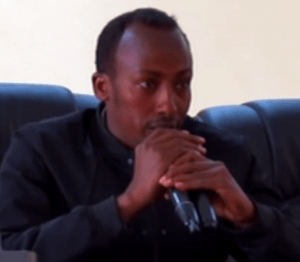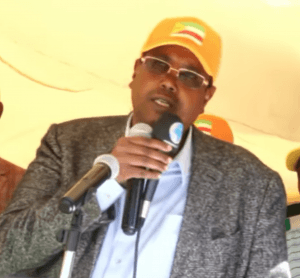Beleaguered Somali region in Ethiopia gets new leader – yet again
Mustafa Muhumed Omer, a former UN staffer, takes the helm as the troubled region’s new president.
By The Star Staff Writer
MOGADISHU – The ruling party of the long-suffering Somali region in Ethiopia has – yet again – dumped the territory’s leader and elected a new one, an official said on Wednesday, a move that illustrates the depth of interference by the Ethiopian government in the internal affairs of the hugely underdeveloped area.
Ethiopia’s Prime Minister Abiy Ahmed has been carrying out major political and economic reforms since he came to power in April this year, but his policy toward Somalis in his country seems not to have changed much, as Addis Ababa still continues to whimsically oust and pick their leaders.
Mustafa Muhumed Omer, who worked with the United Nations in Somalia, was elected to serve as the acting president of the Somali region in Ethiopia until 2020 elections, said Ahmed Abdi Mohamed, who was earlier this month appointed as the region’s president.
Mohamed made the dramatic announcement in a Facebook message from the Ethiopian capital, Addis Ababa.
“Today, we processed and decided to appoint a man called Mustafa Agjar as the region’s president,” said Mohamed, who is the deputy chairman of the ruling party, the Ethiopian Somali People’s Democratic Party, or ESPDP, in the Facebook message. “He is a citizen, hails from the region and has a right to become a president for the region. We believe that he’s capable of fulfilling his duty. Allah will help him. And we will stand by him.”
He said no one has dictated or forced party members to elect Omer, whose nickname is Agjar.
“We were provided with a good environment,” he said.
The Somali region has been in a state of tense calm since its strongman, Abdi Mohamud Omar, was ousted by the Ethiopian government in a quasi-military coup on August 3.
Addis Ababa sent tanks and armored vehicles as well as thousands of soldiers to the region’s capital, Jigjiga, sparking a bloody confrontation that killed dozens of people and destroyed properties, including churches.
A few days later, the region’s ruling party announced that it appointed Mohamed as the marginalized area’s new president after Omar, whose administration was accused of egregious violations of human rights, resigned. Omar was also accused of ordering the killing of the new president’s brother. Ethiopian security agents airlifted Omar to Addis Ababa and haven’t so far released any information about him.

The new leader, who shares the last name with the ousted Omar, is not a member of the ruling party, ESPDP, but Mohamed, the outgoing president, said the party’s internal regulations allow an outsider to be elected as an acting leader until new elections are held, because the party’s central council and executive committee were “on the verge of collapse.”
Mohamed also defended the party’s decision to hold its deliberations in Addis Ababa, far from its headquarters in Jigjiga.
“We were satisfied (with the election of the new president) and explained (the process) to anyone who found it hard to understand,” he said.
He disclosed that senior party members, who were meeting in Addis Ababa for the last few days, discussed the future of the region, especially after the federal government’s military intervention earlier this month.
He unveiled that at least five members of the central council and four members of the executive committee were fired, leaving the door open for more disciplinary actions against senior party officials in the coming days.
 Abdi Mohamud Omar, the ousted president.
Abdi Mohamud Omar, the ousted president.
The ethnic Somalis living in the region — known both as Western Somalia and Ogaden — never voluntarily accepted Ethiopia’s rule since the 19th century, when the British government handed over the territory to Ethiopia.
Somalia and Ethiopia went to war over the area several times, most notably in 19977, when Somali forces briefly retook the region before Ethiopians pushed them back with the help of the Soviet Union and soldiers from Cuba.
The Somalia government has not officially renounced the territory, whose dispute still remains unresolved despite the relatively good relationship between Mogadishu and Addis Ababa. Ethiopian troops are a part of the African Union peacekeeping mission in Somalia.

